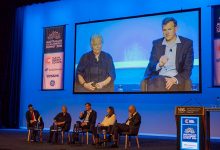The chair of the Energy Security Board, Kerry Schott has given a damming assessment of the state of Australia’s climate and energy policy, declaring that the federal government cannot get its act together, and noting that states have to step in to fill the breach.
Schott told attendees at the Clean Energy Summit that developing a coherent and ambitious national policy on climate change and energy transition may require cutting the Federal Government out of the conversation,.
She was downbeat about the prospect of a meaningful mechanism that involved the Federal Government, but she was encouraged by the action that is being taken by the State and Territory governments to fill the policy vacuum.
“I think in terms of the integration of emissions policy and energy policy, we probably need some form of intervention. I’m not very optimistic on making progress on that front any time soon,” Schott told the conference.
“The thing I think it is happening, which has often happened in energy policy in Australia; is that where the Commonwealth can’t get its act together for whatever reason, the states move in. You can see that the States are moving in on renewables policies, having set their own targets, and these targets are having an impact on national emissions.”
With the looming retirement of large coal-fired generators from the national energy market, the emergence of decentralised variable renewable energy generation and grid connection challenges, a focus on system planning would facilitate a shift towards lower emissions energy sources while protecting consumers from higher costs and a reduction in the reliability of electricity supplies.
The Coalition Federal Government has emerged as the primary barrier to the introduction of emissions reduction policy in Australia, with the energy minister Angus Taylor having both shelved any agreeable policy mechanism for supporting a clean energy transition, and disengaging from ongoing discussions about the development of an agreed policy through the COAG energy council.
The way forward may be through the cooperation of State governments, raising the prospect that the federal government could be completely cut out of discussions about the design of an emissions reduction mechanism that also supports the development of a secure and affordable energy system driven primarily by renewable energy resources.
Schott said that she hoped that the State governments could work together, and downplayed the necessity of the COAG energy council in being the forum where a new emissions reduction mechanism is agreed, particularly following lack of engagement by the Federal energy minister.
“It is not the first time that the COAG Energy Council hasn’t worked very effectively, and whether or not it matters is probably a moot point,” Schott said.
The sentiment was echoed by EnergyAustralia chief Catherine Tanner, who said that it was more important that governments agree on a plan for the future of Australia’s energy system and simply get on with the job of implementing it and that it was time for the countless reviews of the energy market to come to an end.
“I’m a huge fan of consulting, debating and then compromising; but we have had several expert reviews. We just need to get on with what the experts have come up with,” Tanner said.
“People don’t like the answer so people say let’s ask the question again, and we have to resist that. Because it’s all of our respective jobs to make this transition to a clean energy future and make it as smooth, as cost-effective and quick as possible.”
Schott told the Clean Energy Summit that while the COAG energy council hadn’t met since last December, the Federal Government had been pursuing discussions outside of the forum of the COAG Energy Council, meeting with state energy ministers on a “bilateral basis”.
In his own address to the conference, NSW energy minister Matt Kean raised the potential that NSW could ‘go it alone’ on the implementation of an emissions reduction policy, reiterating the NSW Government’s support for the National Energy Guarantee.
“We need a national framework that properly integrates energy and climate change policy. The NSW government still supports the National Energy Guarantee and will continue to support a national mechanism that integrates climate change energy policy,” Kean said.
“If the Commonwealth won’t get on board, NSW will consider going it alone.”
Many of the states and territories have made similar threats over the years, following sandbagging on energy policy by the Federal government.
Kean outlined his vision for investment in energy infrastructure in New South Wales, with the NSW Government seeing its role as being a facilitator of private investment in new renewable energy generation and network infrastructure, rather than being the primary driver through direct investment in projects.
“We want NSW to be the easiest jurisdiction in the OECD to do business and develop new infrastructure,” Kean said in his address to the Australian Clean Energy Summit.
Kean said that the NSW Government would only intervene in the energy market, as a provider of last resort, only if it is needed. Kean said that it was the preference of the NSW Government to establish the business conditions that could allow businesses to fill this role.
While the NSW minister and chair of the Energy Security Board both expressed the opinion that the way forward on Australian climate and energy policy might be through the exclusion of the Federal government, federal energy minister Angus Taylor will not attend the Clean Energy Summit, who is attending Parliamentary sittings in Canberra.










